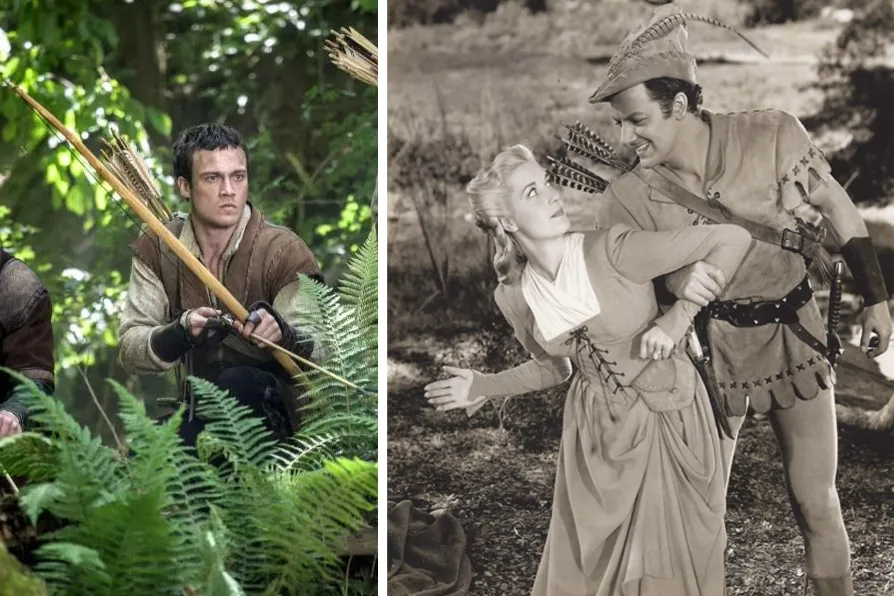GORDON PARSONS applauds a marvellous story of human ingenuity and youthful determination, well served by a large and talented company
The new corporate version of Robin Hood is a betrayal of the anti-colonial hero of the people of yore, suggests DENNIS BROE

 WEALTH REDISTRIBUTION REQD:(L) Jack Patten as Amazon’s Robin, a Saxon Lord, 2025; (R) Jill Esmond an Richard Greene in The Adventures of Robin Hood (1955) [Pics: IMDb]
WEALTH REDISTRIBUTION REQD:(L) Jack Patten as Amazon’s Robin, a Saxon Lord, 2025; (R) Jill Esmond an Richard Greene in The Adventures of Robin Hood (1955) [Pics: IMDb]
THE Robin Hood myth, legend and fact continues to exert a powerful pull, especially in in our own land where robbing from the rich and giving to the poor, or even taxing the rich and taking a meagre portion of their income, is a major battle.
Into the fray comes a contemporary television series, titled simply Robin Hood, produced and broadcast on MGM+, the studio recently bought by Amazon.
This Robin, full of raucous, savage violence and gratuitous sex, dispenses with wealth distribution and instead focuses on a quarrel among elites: Norman lords versus Saxon lords, with the young Robin’s father the latter. The peasantry are almost nowhere to be found and when they do show up in a wedding ceremony they bop around, not like weary toilers of the soil, but like Hobbits.
The situation figured here unfortunately has element of accuracy, because what we get in most British and American mainstream media is indeed a debate between one group of the wealthy and another, be that Labour and the Tories, or Republicans and Democrats, with the actual will of the people almost nowhere in evidence.
We had Errol Flyn’s swashbuckling Robin Hood in the 1930s, the television series The Adventures of Robin Hood in the 1950s, and now we have Jeff Bezos’s Robin Hood, where two CEOs hammer it out while the serfs are left to till their digital fields on the AI manor.
But all is not lost in the legend. The Adventures of Robin Hood (all 143 episodes from 1955 to 1959 available for free on YouTube and Dailymotion) was the first hit of the fledgling and more populist BBC challenger, the ITV network, and featured scripts written by blacklisted casualties of the McCarthy era in New York, Los Angles and on the continent including Hollywood Ten CPUSA members Ring Lardner Jr and Adrian Scott.
Their Robin Hood is a critique of colonialism. It hit the airwaves in the wake of both the 1955 Bandung Conference of non-aligned nations seeking their own sovereignty and independence, and the guerilla wars that both proceeded and followed the conference as country after country revolted and won their freedom from the colonial European powers.
The colonial exploitation, revived in the aftermath of WWII, was particularly dominant in the British treatment of India. Just as in the series the Norman lords exploit the Saxon peasants, with Robin defining himself as “a Saxon outlaw,” so too the British decimated India through a system of exorbitant taxes that forced the Indians to export food and cotton even in times of famine, in a system of legal plunder. Likewise, the complaint of Sherwood Forest in multiple episodes is the high taxes the serfs are forced to pay to support the lifestyle of the Norman lords while they are barely able to feed their families.
Likewise the Dutch in Indonesia, when the Dutch tried to recolonise the country from the Japanese after World War II. The Indonesians waged a fierce four-year guerilla war where the objective was to harass the enemy. In this war, the Dutch held the main roads and the Indonesian Republicans swarmed into the mountains and held the hinterlands. One of the main antitheses in the series is the contrast in the locations between the lords in their castles and the commoners and outlaws in the forest. The Indonesians were adept at picking off convoys which ventured into the countryside, just as Robin’s men often robbed those representatives of the landed gentry who dared to enter the forest.
“The principle of guerilla warfare” as stated by one of the Indonesian leaders is: “If the people support you, you will always win.” As Robin states: “We’re never alone as long as we have friends among the people.”
In 1955, with independence secured, the Indonesian president Sukarno convened the Bandung Conference in Java, attended by prominent African, Asian and African-American advocates for the overthrow of colonialism.
The spirit of Bandung spread precisely in the years that Robin and his merry men battled the Norman colonisers in Sherwood on British and US television. In this period many of the British, French, and Belgium colonies won their independence, often by waging guerilla wars.
“A Guest for The Gallows” commences with the Sheriff’s tax collectors arriving with two boxes loaded with tribute while naming one yeoman for being behind on his taxes. The sheriff orders him to be hanged for his negligence. A sympathiser steals off in the night to warn the outlaws.
Robin plays on the greed of the sheriff by offering him one hundred cattle if he will come with him into the forest. Robin then arranges a trade, but the sheriff’s men betray the arrangement and attempt to ambush Robin. Friar Tuck and his monks get in the way of the ambush, fulfilling Robin’s dictum about having the backing of the people.
The Adventures of Robin Hood expresses not only the domestic concerns of blacklistees but also a larger, more multinational concern with the anti-colonial struggles for independence, concomitant with this iteration of the legend. It stands in stark contrast to Amazon’s Robin, a version that only reflects the greed of our contemporary Gilded Age.
Robin Hood is currently streaming on Amazon









